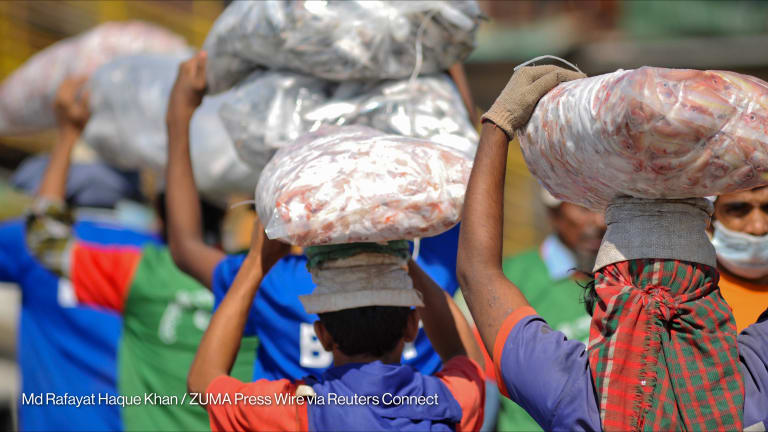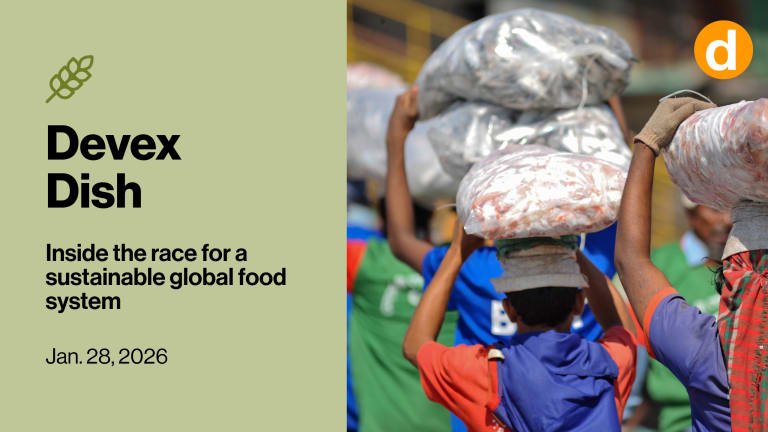
The global COVID-19 vaccination campaign has been described as the largest public health initiative ever undertaken — and it has presented low- and middle-income countries with unprecedented challenges in vaccine procurement and delivery.
Though the most urgent challenges at the moment are focused on acquiring vaccine doses, public health experts believe that as LMICs begin to receive more vaccines they will inevitably start dealing with the challenge of distributing them. And one sticking point is likely to be cold chain storage capacity — or lack thereof.
Join Devex @ WHA 2021
From May 25 to 27, and in a special Devex Pro event on June 1, we will bring you inside the 74th World Health Assembly to answer key questions. Register now.
Different vaccines require different temperatures. Moderna’s vaccine must be stored at -20 degrees Celsius, and for Pfizer’s shot that temperature drops to -70 C. Both require an additional investment in ultracold storage boxes which typically cost between $10,000 and $20,000 each.
But even though AstraZeneca and Johnson & Johnson vaccines can be kept in regular refrigerators, a recent report by Sustainable Energy for All, or SEforALL, described the scale of the cold chain challenge needed to reach herd immunity — using conventional storage temperatures of between 2 C to 8 C — as “immense.”
As concerns and hesitancy around COVID-19 vaccines that require these conventional storage parameters increase, health experts say this may lead to more interest in vaccines that require ultracold storage and an even greater need for cold chain storage investment.
“It’s an intersectoral problem so it requires an intersectoral solution so that means coordination between energy and health as well as coordination between public and private.”
— Luc Severi, Powering Healthcare program manager, SEforAllSpeaking at the launch of the SEforAll report, Martina Bosi, a senior energy economist at the World Bank, said an increase in supply and increased interest in vaccines that require ultracold chain storage may increase vaccine readiness gaps.
“The current trickling of the vaccine does not require massive cold chain upgrades but when this volume increases … then some countries will really feel a crunch,” she said.
Last year, the World Bank, together with the World Health Organization, UNICEF, the Global Fund to Fight AIDS, Tuberculosis and Malaria, and Gavi, the Vaccine Alliance carried out readiness assessments in more than 100 LMICs. The assessments found that just over 50% of countries assessed had the cold chain capacities needed to deploy vaccines.
But Bosi said these assessments were based on the cold chain capacity for “the regular temperature vaccines” and not those requiring ultracold storage.

“We have all heard about concerns with the vaccine and some increased hesitancy and we expect to see some growing interest in securing the Pfizer vaccine with particularly stringent temperature requirements,” she said. “In this case, we would see certainly gaps in the ultracold chain readiness.”
In March, several European countries halted the use of the AstraZeneca vaccine — the main vaccine distributed by the COVAX Facility — following reports of blood clots. Though these countries have since resumed vaccination campaigns after regulatory bodies deemed the vaccine to be safe, there is still poor uptake of the vaccine.
Sign up for Devex CheckUp
The must-read weekly newsletter for exclusive global health news and insider insights.
In Africa, Malawi destroyed 16,000 expired doses of the AstraZeneca vaccine after failing to administer them before they expired and the Democratic Republic of Congo has opted to return 1.3 million of the 1.7 million doses of AstraZeneca it received through the COVAX Facility after determining they would not be able to administer them before they expire in June.
Dr. Richard Mihigo, program area manager for immunization and vaccine development at WHO Africa, said there has been “a surge in terms of vaccine hesitancy particularly in urban areas where there is a high penetration of social media.”
In addition to investment in cold chain equipment, reliable energy access to power cold chain solutions will also be pivotal as vaccination campaigns ramp up.
A 2018 study found that 59% of health care facilities in LMICs lacked reliable electricity, which would be necessary to power vaccine storage appliances. In addition, a review of health facilities in sub-Saharan Africa showed that 1 in 4 had no access to electricity at all.
Anstes Agnew, head of health systems delivery at the Tony Blair Institute for Global Change, said the challenge is more pronounced in rural areas, where health facilities might not have refrigerators, internet connections, or a reliable power supply.
“Thinking about all those enabling infrastructure questions is going to remain a really important challenge for countries to tackle," she said.
Ensuring that vaccines are not centered in urban areas but are also made available to rural communities that may be very far away from health centers will be essential to ensure equitable access within countries, said Luc Severi, program manager for Powering Healthcare at SEforAll.
Though COVID-19 has made access to energy a priority for health sector actors and energy actors, he said there is “a big challenge to turn this momentum into action.”
“It’s an intersectoral problem so it requires an intersectoral solution so that means coordination between energy and health as well as coordination between public and private,” he said.
To address challenges related to electricity access and unreliable power, Gavi and UNICEF are investing in solar solutions. According to SEforAll, Gavi is procuring 65,000 off-grid-ready, solar direct-drive refrigerators for last-mile vaccine delivery in nearly 50 countries and UNICEF began purchasing 92,000 vaccine refrigerators — 11,325 of them are solar powered — as well as cold boxes and vaccine carriers.
The World Bank’s Bosi said the pandemic has also presented an opportunity for countries to establish long-term solutions.
“This is not the last time we are ... going to see a health crisis,” she said. “We are really keen to help countries that are interested to invest in a more reliable, sustainable cold chain infrastructure and that is more climate friendly.”
Sara Jerving contributed to this article.





